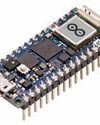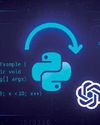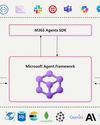Intentar ORO - Gratis
AlOps: Integrating AI with DevOps
Open Source For You
|September 2024
By integrating AI with DevOps, we can harness the power of both technologies to quicken the development of quality software. Open source DevOps tools now come with AI integrated in them to automate the software development lifecycle and enhance security features.

Artificial intelligence (AI) has emerged as a transformative force across various sectors, significantly influencing market dynamics and industry growth. As enterprises increasingly integrate AI-driven solutions into their operations, they unlock opportunities for enhanced automation, predictive analytics, and personalised consumer experiences. This integration not only propels operational efficiencies but also catalyses the expansion of AIdriven markets, which are witnessing exponential growth across diverse industries, ranging from healthcare and finance to manufacturing and retail.
Integration of AI and DevOps with robotics
In the realm of AI and DevOps, robots play an increasingly crucial role within data centres, integrating seamlessly to enhance operational efficiency and automation. These robots, often embodied in physical machines or as virtual entities within software systems, contribute significantly to the management and optimisation of data centre environments.
For instance, consider a data centre where physical robots are deployed for routine maintenance tasks such as cable management, hardware inspections, and inventory checks. These robots are equipped with advanced sensors and AI algorithms that enable them to navigate the complex infrastructure autonomously. They can detect hardware malfunctions, predict when components are likely to fail based on wear and tear patterns, and even perform preventive maintenance tasks. This level of automation reduces the need for manual intervention, decreases the likelihood of human error, and ensures that hardware components are functioning optimally, thus enhancing the overall reliability of the data centre.
Esta historia es de la edición September 2024 de Open Source For You.
Suscríbete a Magzter GOLD para acceder a miles de historias premium seleccionadas y a más de 9000 revistas y periódicos.
¿Ya eres suscriptor? Iniciar sesión
MÁS HISTORIAS DE Open Source For You

Open Source For You
The Role of Open Source in Building Modern Data Infrastructure
It's no secret that open source is emerging as the backbone of modern data infrastructure. Here’s a list of the core open source technologies used to deploy this infrastructure, along with some real-world examples and a brief on why open source matters.
3 mins
December 2025

Open Source For You
The Whispering Machines: How Open Source is Bringing Intelligence to the Tiniest Devices
Built on open source frameworks, TinyML is enabling complex machine learning models to run on the microcontrollers embedded in connected devices, bringing artificial intelligence to the very edge of the network.
3 mins
December 2025

Open Source For You
Setting Up Snort to Secure Your Network
Snort is a popular, open source intrusion detection system that monitors traffic in real time to detect malware. Here’s a detailed explanation of how to set it up on Ubuntu and test it by generating traffic from another system.
7 mins
December 2025

Open Source For You
When AI Meets DevOps to Build Self-Healing Systems
Traditional DevOps, with its rule-based automation, is struggling to work effectively in today’s complex tech world. But when combined with AlOps, it can lead to IT systems that predict failures and solve issues without human intervention.
7 mins
December 2025

Open Source For You
How to Automate Java Code Modernisation
This short guide illustrates that automating Java code modernisation with Python and OpenAI API is not just possible-it's remarkably effective.
5 mins
December 2025

Open Source For You
The Quest to Build a Quantum Computer
The road to large-scale quantum computing is long and hard, with incremental advances paving the way. But the destination is in sight.
12 mins
December 2025

Open Source For You
Job Opportunities: What's Hot in the Cloud Space?
If there's one field that refuses to slow down, it's cloud computing. Even as automation and AI reshape roles, cloud adoption continues to surge. From startups deploying microservices overnight to enterprises migrating decades of legacy systems, cloud remains the engine of digital transformation. For professionals, this means one thing: skills that live in the cloud won't come down anytime soon.
2 mins
December 2025

Open Source For You
Securing Client Identity with Post-Quantum Cryptography
Here's a quick tutorial on how to build a secure, real world client-server model that establishes client identity by using CRYSTALS-Dilithium, a post-quantum cryptography algorithm.
3 mins
December 2025

Open Source For You
Unlocking the Power of Multi-Agent Solutions with the Microsoft Agentic Framework
The Microsoft Agentic Framework is rapidly emerging as a cornerstone for developers, architects, and technology leaders seeking to build dynamic, intelligent systems powered by multiple collaborating agents. In an era where automation, distributed intelligence, and adaptive software are increasingly vital, this framework offers robust tools and features to accelerate the design and deployment of agent-based solutions.
6 mins
December 2025

Open Source For You
Apache Iceberg and Trino: Powering Data Lakehouse Architecture
Apache Iceberg is a cornerstone of any open data lakehouse, providing the transactional foundation upon which highly scalable and flexible analytics can flourish. Along with Trino, it can be used to build a robust, scalable, and high-performance data lakehouse.
4 mins
December 2025
Listen
Translate
Change font size
